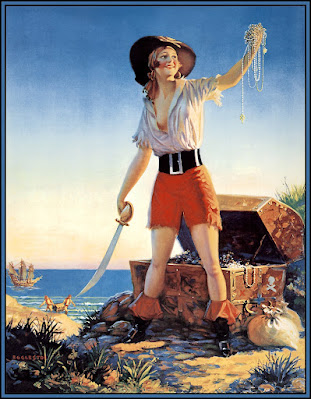Antonia Gizzi, the young ward of my Silver Rush protagonist Inez Stannert, dreams of living a life full of derring-do.
But wait.
Can she? In 1882? When did derring-do first come into use and what's its origin, anyway?
Slang-o-rama shall save the day, galloping to the rescue of derring-do (which, according to Merriam-Webster, means "daring action").
>
>
>
>
>
>
>
>
>
>
According to the Online Etymology Dictionary, Antonia certainly could think of derring-do, since the term made its first appearance in the 1570s, long before the 19th century! OED adds some interesting background, which shows its roots go back way before that:
...[O]riginally (late 14c.) dorrying don, literally "daring (to) do," from durring "daring," present participle of Middle English durren "to dare" .... Chaucer used it in passages where the sense was "daring to do" (what is proper to a brave knight). Misspelled derrynge do in 1500s and mistaken for a noun by Spenser, who took it to mean "manhood and chevalrie;" picked up from him and passed on to Romantic poets as a pseudo-archaism by Sir Walter Scott.
The Phrase Finder has a nice post following the disintegration of the original phrase to the one we know so well, saying in part:
The earliest form of 'derring-do' in print is found in Geoffrey Chaucer's Troylus And Criseyde, circa 1374: "In durring don that longeth to a knight." Chaucer was using the two words 'durring' and 'don' with their usual 14th century meanings of 'daring' and 'do'. This line in his work translates into 20th century language as 'in daring to do what is proper for a knight'. The poet John Lydgate, paraphrased Chaucer in The Chronicle of Troy, 1430, and his 'dorryng do' was misprinted in later versions of the work as 'derrynge do'.
In reading the above, the celebrated Tudor poet Edmund Spenser appears not to have realised that derrynge was a misprint of durring, the meaning of which he would have been familiar with, and interpreted 'derrynge do' as meaning 'brave actions'. That was the way he used it in several of his late 16th poems, including his best-known work, The Faerie Queene, 1596: "A man of mickle name, Renowned much in armes and derring doe."
Last, but not least, make way for that inveterate plunderer of historic language, Sir Walter Scott. His use of 'derring-do' as a single word in the hugely popular novel Ivanhoe, 1820, cemented it into the language...
So, Antonia is allowed a little swashbuckle and derring-do, etymologically speaking. Although, since she is a girl, late-19th-century society would no doubt frown upon her doing so.
 |
| Yo-ho-ho and a touch of derring-do! By Edward Mason Eggleston (1882-1941) - artmight.com Treasure Princess, Public Domain https://commons.wikimedia.org/w/index.php?curid=89375904 |













No comments:
Post a Comment